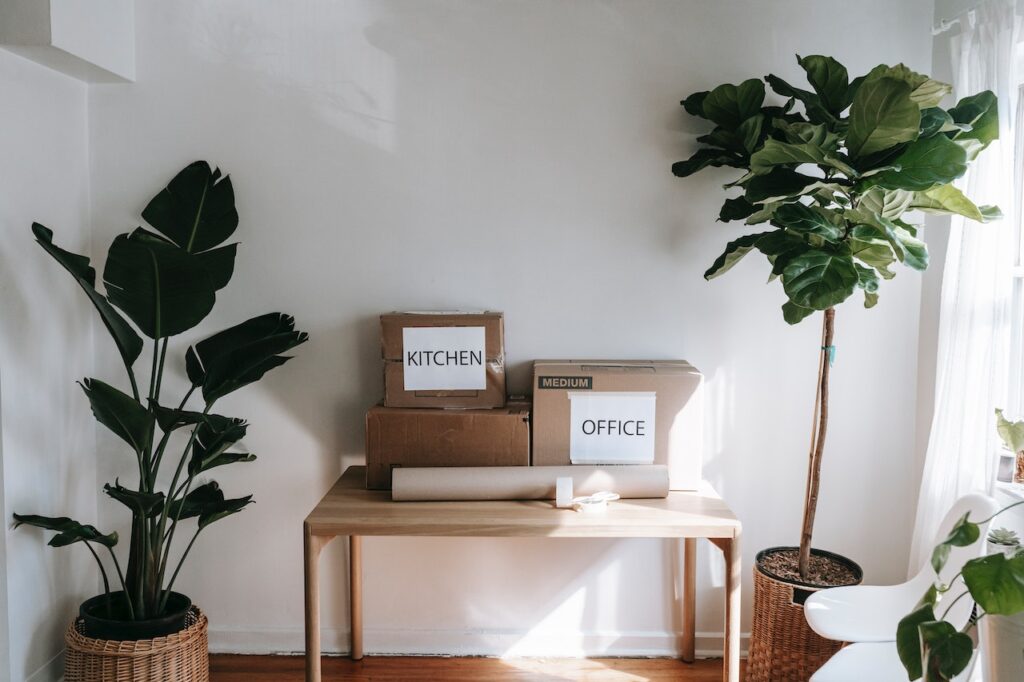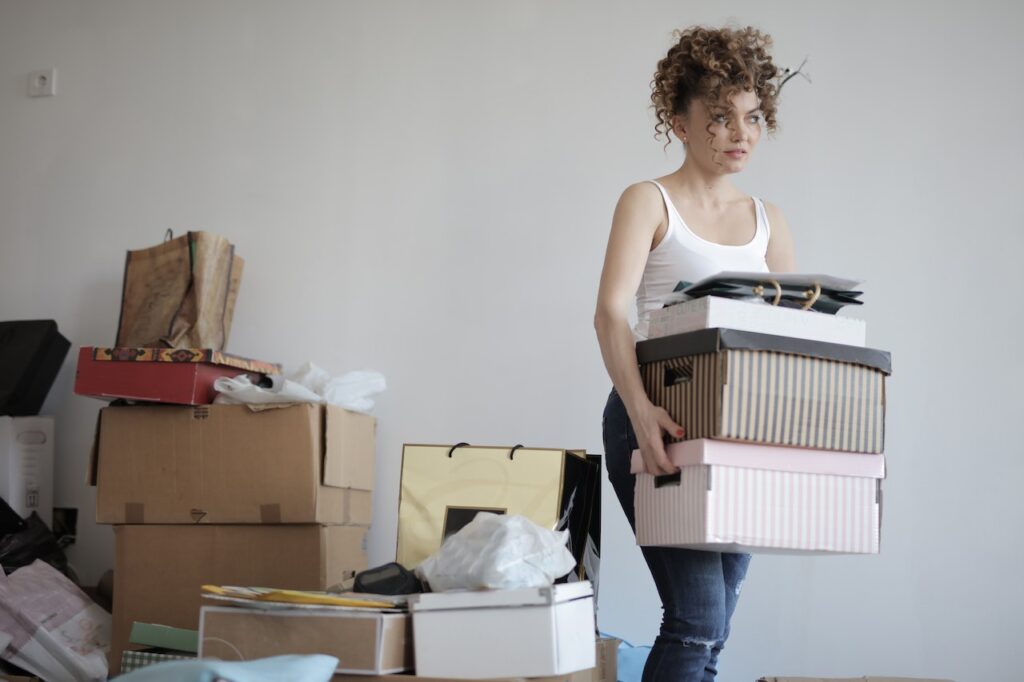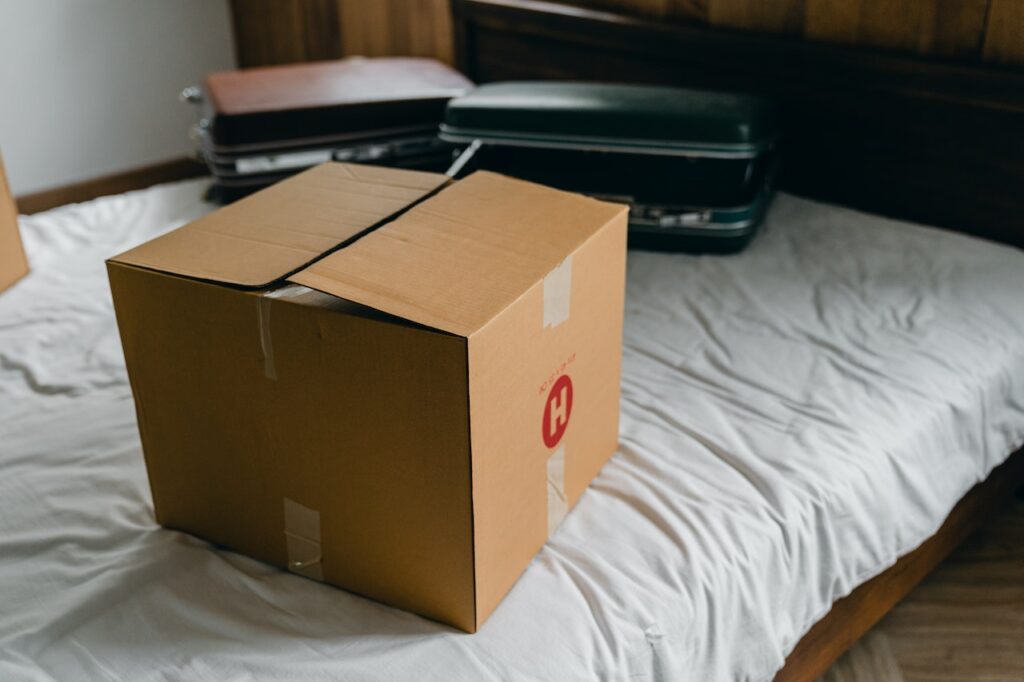Moving out at 18 can be an exciting and liberating experience for many young adults. However, it can also be overwhelming and stressful, especially if you are not prepared. Understanding the basics of moving out, planning your move, and managing your finances are essential steps to take before embarking on this new chapter of your life.
To start, it’s important to understand the basics of moving out. This includes finding an apartment, signing a lease, and setting up utilities. It’s also important to consider your living situation, such as whether you will be living alone or with roommates. Planning ahead can help you avoid unexpected expenses and make the transition smoother.
Key Takeaways
- Understanding the basics of moving out is essential before embarking on this new chapter of your life.
- Planning your move and managing your finances are important steps to take before moving out.
- Consider your living situation, such as whether you will be living alone or with roommates, to avoid unexpected expenses and make the transition smoother.
Understanding the Basics of Moving Out
Moving out at 18 is a significant transition towards independence and adulthood. It is a big step that requires careful planning and execution. Understanding the basics of moving out can help make the process smoother and less stressful.
One of the first things to consider is the financial aspect of moving out. It is important to have a stable income and a budget plan in place to cover expenses such as rent, utilities, groceries, and transportation. Creating a spreadsheet or using a budgeting app can help keep track of expenses and ensure that bills are paid on time.
Another crucial aspect of moving out is finding a suitable living arrangement. This can involve researching different neighborhoods, apartment complexes, or roommates. It is important to consider factors such as safety, proximity to work or school, and cost when making a decision.
Before moving out, it is also important to take inventory of personal belongings and decide what to keep, sell, or donate. This can help reduce clutter and make the moving process more efficient. It is also important to research and purchase necessary items such as furniture, kitchen appliances, and cleaning supplies.
Lastly, it is important to remember that moving out at 18 comes with newfound freedom and responsibilities. It is important to maintain a healthy balance between independence and seeking help from family or friends when needed. With careful planning and execution, moving out at 18 can be a successful and rewarding transition towards adulthood.
Planning Your Move
Moving out at 18 can be a daunting task, but with proper planning, it can be a smooth transition. A moving plan is essential to ensure everything is done in an organized and timely manner. The following tips will help in planning your move.
Research
Before moving out, research the area where you plan to move. Look for apartments or houses that fit your budget and lifestyle. Check the cost of living, transportation, and other amenities that are important to you. This will help you make an informed decision and avoid any surprises.
Timeline
Create a timeline for your move. Start by setting a move-out date and work backward to plan the steps leading up to it. This will help you stay on track and avoid last-minute stress. Give yourself enough time to pack, arrange for movers, and take care of any other tasks that need to be completed before the move.
Budget
Moving can be expensive, so it’s important to create a budget. Make a list of all the expenses you will incur, including rent, utilities, moving costs, and any other expenses. This will help you stay within your budget and avoid overspending.
Packing
Packing can be overwhelming, but with a plan, it can be done efficiently. Start by decluttering and getting rid of items you no longer need. Then, create a packing plan and pack one room at a time. Label each box with its contents and the room it belongs in. This will make unpacking easier and more organized.
Moving Day
On moving day, make sure everything is packed and ready to go. Double-check that you have all your important documents, such as your ID, passport, and lease agreement. If you’re using movers, make sure they have clear instructions on where to go and what to do.
In conclusion, planning your move is crucial to ensure a successful transition to your new home. By doing research, creating a timeline, setting a budget, and packing efficiently, you can make your move a stress-free experience.
Financial Considerations
Moving out at 18 can be an exciting and liberating experience, but it also comes with financial responsibilities. Here are some financial considerations to keep in mind when planning to move out.
Income
Having a steady source of income is crucial when moving out. Whether it’s a full-time job or a part-time gig, having a regular income stream will help cover monthly expenses and save money for unexpected expenses. It’s important to have a clear understanding of how much money is coming in each month to create a budget.
Budgeting
Creating a monthly budget is essential when moving out. It helps to keep track of expenses and ensure that there is enough money to cover all bills and living expenses. Consider using a budgeting app or spreadsheet to keep track of expenses and adjust the budget accordingly.
Living Expenses
Living expenses can add up quickly when moving out. It’s important to consider the cost of rent, utilities, groceries, transportation, and other necessary expenses when creating a budget. Look for ways to save money, such as cooking at home instead of eating out, using public transportation, or finding a roommate to split rent and utilities.
Savings
Having savings is crucial when moving out. It’s important to have an emergency fund to cover unexpected expenses such as car repairs or medical bills. Aim to save at least three to six months’ worth of living expenses to ensure financial stability.
Financial Obligations
Moving out also means taking on financial obligations such as rent, utilities, and other bills. It’s important to make payments on time to avoid late fees and negative impacts on credit scores. Consider setting up automatic payments or reminders to ensure that bills are paid on time.
Overall, moving out at 18 requires careful financial planning and budgeting. By creating a budget, saving money, and being mindful of expenses, it’s possible to achieve financial freedom and successfully navigate the transition to independent living.
Building a Credit History
Building a good credit history is an essential part of becoming financially independent. It can be especially important when you’re moving out at 18 and need to rent an apartment, buy a car, or take out a loan. Here are some tips on how to build a credit history:
Start with a Secured Credit Card
A secured credit card is a type of credit card that requires a cash deposit as collateral. This deposit is used as security in case the cardholder fails to make payments. Secured credit cards are a great way to start building credit because they are easier to get approved for than traditional credit cards. They also report to the credit bureaus, which means that your payment history will be recorded on your credit report.
Become an Authorized User
Another way to start building credit is to become an authorized user on someone else’s credit card. This means that you are given permission to use someone else’s credit card, and your activity on the card is reported to the credit bureaus. However, it’s important to note that not all credit card companies report authorized user activity, so make sure to check with the card issuer first.
Use Credit Cards Responsibly
Once you have a credit card, it’s important to use it responsibly. This means making payments on time and keeping your credit card activity within your credit limit. Your payment history and credit card activity are two of the most important factors that determine your credit score, so it’s important to keep them in good standing.
Monitor Your Credit Report
Monitoring your credit report is an important part of building a good credit history. Your credit report is a record of your credit history, including your payment history, credit card activity, and credit inquiries. You can get a free copy of your credit report from each of the three major credit bureaus once a year. It’s important to review your credit report regularly to make sure that there are no errors or fraudulent activity.
Use Credit Karma
Credit Karma is a free credit monitoring service that provides you with your credit score and credit report. It also offers personalized recommendations on how to improve your credit score. Using Credit Karma can be a great way to stay on top of your credit history and make sure that you’re on the right track to building a good credit history.
Conclusion
Building a good credit history takes time and effort, but it’s an important part of becoming financially independent. By starting with a secured credit card, becoming an authorized user, using credit cards responsibly, monitoring your credit report, and using Credit Karma, you can build a good credit history and set yourself up for financial success.
Finding and Renting Your First Apartment
Renting your first apartment can be an exciting and daunting experience. Here are some tips to help you find and secure your first apartment.
Determine Your Budget
Before you start looking for apartments, it’s important to determine your budget. Consider your income, expenses, and how much you can realistically afford to spend on rent each month. Keep in mind that you’ll also need to budget for utilities, groceries, and other living expenses.
Start Your Search
There are many resources available to help you find your first apartment. Some popular options include online apartment search websites, social media groups, and classified ads. You can also work with a real estate agent or apartment locator service.
When searching for apartments, consider factors such as location, size, amenities, and proximity to public transportation. Make a list of your must-haves and nice-to-haves to help narrow down your options.
Schedule Viewings
Once you’ve found some apartments that meet your criteria, schedule viewings with the landlords or property managers. During the viewing, ask questions about the apartment, such as the rent cost, security deposit, and lease terms.
Be sure to inspect the apartment thoroughly for any damages or issues. Take note of any repairs that need to be made and discuss them with the landlord.
Secure Your Apartment
If you find an apartment that you like and can afford, it’s time to secure it. You’ll typically need to fill out an application and provide proof of income and identity. You’ll also need to pay a security deposit and first month’s rent.
Before signing the lease, make sure you understand all of the terms and conditions. Ask questions about anything that you’re unsure of. Once you sign the lease, you’re legally bound to the terms of the agreement.
By following these tips, you can find and secure your first apartment with confidence.
Understanding and Managing Living Expenses
Moving out at 18 can be an exciting and liberating experience, but it also comes with its own set of challenges. One of the most important aspects of living independently is understanding and managing living expenses.
To begin with, it is essential to set a budget and stick to it. This can be done by keeping track of all income and expenses and making sure that the expenses do not exceed the income. It is also important to have an emergency fund for unexpected expenses.
Insurance is another crucial aspect of managing living expenses. Renters insurance is a must-have for anyone living in a rented apartment or house. It covers the cost of replacing personal belongings in case of theft or damage caused by natural disasters. Health insurance is also important as it covers medical expenses in case of illness or injury.
Paying bills on time is another crucial aspect of managing living expenses. Late payment fees can add up quickly and lead to unnecessary expenses. Setting up automatic payments or reminders can help ensure that bills are paid on time.
Setting up utilities such as electricity, water, and gas is also an important part of managing living expenses. It is important to research and compare different service providers to find the best rates and deals.
Transportation costs can also add up quickly. It is important to consider the cost of gas, maintenance, and insurance when purchasing a vehicle. Public transportation can be a cost-effective alternative for those who do not need a car.
In summary, understanding and managing living expenses is a crucial aspect of living independently. Setting a budget, having insurance, paying bills on time, setting up utilities, and considering transportation costs are all important factors to consider when moving out at 18.
Creating an Emergency Fund
Moving out at 18 can be a daunting task, especially when it comes to managing finances. One essential aspect of financial planning is creating an emergency fund. An emergency fund is a separate account that is specifically designated for unexpected expenses.
Having an emergency fund can help individuals avoid taking on debt or relying on credit cards when unexpected expenses arise. It can also provide peace of mind and help individuals feel more secure in their financial situation.
To create an emergency fund, individuals should first determine how much they need to save. A good rule of thumb is to have at least three to six months’ worth of living expenses saved up. This amount can vary depending on individual circumstances, such as job stability and monthly expenses.
Once the amount has been determined, individuals should set up a separate savings account specifically for their emergency fund. This account should be easily accessible in case of an emergency, but not so easily accessible that it is used for non-emergency expenses.
Individuals should make a habit of contributing to their emergency fund regularly, even if it is just a small amount each month. This can help build up the fund over time and ensure that it is available when needed.
In summary, creating an emergency fund is an essential part of financial planning when moving out at 18. It can provide peace of mind and help individuals avoid taking on debt or relying on credit cards when unexpected expenses arise. By determining the amount needed, setting up a separate account, and contributing regularly, individuals can ensure that they are prepared for any unexpected expenses that may come their way.
Managing Your Bank Account
When moving out at 18, managing your bank account is an important aspect of becoming financially independent. Here are some tips to help you manage your bank account effectively:
Open a Bank Account
The first step to managing your bank account is to open one. Look for a bank that offers low fees and interest rates. You may want to consider online banks as they often offer higher interest rates and lower fees than traditional banks. Make sure to read the terms and conditions carefully before opening an account to avoid any surprises.
Keep Track of Your Transactions
It’s important to keep track of your transactions to avoid overdraft fees and to ensure that you have enough money in your account to cover your expenses. You can use a spreadsheet or a budgeting app to keep track of your income and expenses. Make sure to check your account regularly to avoid any fraudulent activity.
Set Up Automatic Payments
Setting up automatic payments for bills and other expenses can help you avoid late fees and ensure that your bills are paid on time. You can set up automatic payments through your bank’s website or by contacting the company directly. Make sure to keep track of these payments to avoid any surprises.
Use Mobile Banking
Most banks offer mobile banking apps that allow you to check your account balance, transfer money, and deposit checks from your phone. This can be a convenient way to manage your account on the go. Make sure to keep your phone and app secure to avoid any unauthorized access to your account.
Conclusion
Managing your bank account is an important part of becoming financially independent. By following these tips, you can ensure that your account is managed effectively and avoid any unnecessary fees or surprises.
Balancing Work and School
Balancing work and school can be a challenging task for anyone, especially for those who are moving out at 18. It requires a lot of planning, discipline, and time management skills. However, it is possible to achieve success in both areas with the right mindset and strategies.
One of the most important things to consider when balancing work and school is to prioritize your tasks. It is essential to identify the most critical tasks and allocate enough time for each one. For example, if you have an exam coming up, you should prioritize studying over work. On the other hand, if you have an important project at work, you should prioritize work over school.
Another strategy to balance work and school is to create a schedule that works for you. This means finding a balance between working hours and school hours that allows you to complete all your tasks without feeling overwhelmed. You can use a planner or a calendar to schedule your tasks and make sure you have enough time for everything.
It is also essential to take care of yourself while balancing work and school. This means getting enough sleep, eating well, and exercising regularly. Taking care of your physical and mental health will help you stay focused and productive, which is essential for success in both areas.
Finally, it is crucial to gain experience in your field of interest while balancing work and school. This can be done by finding internships or part-time jobs that relate to your career goals. Not only will this provide you with valuable experience, but it will also help you build a professional network that can help you in the future.
In conclusion, balancing work and school can be challenging, but it is possible with the right strategies and mindset. Prioritizing tasks, creating a schedule, taking care of yourself, and gaining experience are all essential for success in both areas.
Exploring Side Hustles
When it comes to moving out at 18, having a side hustle is a great way to earn extra income. A side hustle can be anything from selling handmade crafts on Etsy to driving for Uber or delivering food for DoorDash. Here are a few side hustles to consider:
Babysitting
Babysitting is a great way to earn some extra cash, especially if you enjoy spending time with kids. You can advertise your services on social media or through word of mouth. Make sure to set your rates ahead of time and be clear about your availability.
Uber
If you have a car and a clean driving record, driving for Uber can be a good way to earn money on your own schedule. You’ll need to pass a background check and have a valid driver’s license and insurance.
DoorDash
Delivering food for DoorDash is another flexible way to earn money. You can choose your own hours and work as much or as little as you want. You’ll need a car, a valid driver’s license, and insurance.
Etsy
If you’re crafty, selling handmade items on Etsy can be a fun way to earn money. You can sell anything from jewelry to home decor to clothing. Make sure to take good photos of your items and price them competitively.
Overall, there are many different side hustles to explore when you’re looking to earn extra income. Whether you choose to babysit, drive for Uber, deliver food for DoorDash, or sell items on Etsy, make sure to set clear goals and expectations for yourself. With hard work and dedication, you can turn your side hustle into a successful source of income.
Furnishing Your Place
When moving out at 18, furnishing your new place can be a daunting task. Here are some tips to make it easier:
- Determine your budget: Before buying anything, it’s important to know how much you can afford to spend on furnishings. Make a list of what you need and prioritize accordingly.
- Shop second-hand: You can save a lot of money by shopping for furniture and decor at thrift stores, garage sales, and online marketplaces like Craigslist or Facebook Marketplace.
- Invest in quality basics: While it may be tempting to buy cheap furniture, investing in high-quality basics like a comfortable mattress, sturdy couch, and durable dining table will pay off in the long run.
- Get creative with decor: You don’t have to spend a lot of money on decor to make your place feel like home. DIY projects, like painting old furniture or making your own wall art, can add a personal touch to your space.
- Consider storage solutions: When living in a small space, storage is key. Look for furniture with built-in storage, like a bed with drawers underneath or a coffee table with a lift-top.
- Don’t forget the essentials: Make sure to have all the essentials, like bedding, towels, and kitchen supplies, before moving in. Start with the basics and add to your collection as needed.
By following these tips, furnishing your new place can be a fun and rewarding experience.
Living with Roommates
When moving out at 18, living with roommates is often a popular choice due to the cost savings and potential for socialization. However, it can also come with its own set of challenges. Here are some tips for navigating the roommate experience:
- Set clear expectations: Before moving in together, it’s important to have a conversation about each person’s expectations for living arrangements. This includes things like cleanliness, noise levels, and sharing of common spaces. Creating a written agreement can also help avoid misunderstandings down the line.
- Respect each other’s space: Living with roommates means sharing a living space, but it’s still important to respect each other’s personal space. This includes things like knocking before entering a roommate’s bedroom and asking before borrowing personal items.
- Communicate effectively: If issues do arise, it’s important to communicate effectively with roommates. This means addressing problems in a calm and respectful manner, and being open to compromise. Avoiding passive-aggressive behavior and gossiping about roommates behind their back can help maintain a positive living environment.
- Maintain a social life outside of the apartment: While it’s great to have roommates to socialize with, it’s also important to maintain a social life outside of the apartment. This can help avoid potential conflicts and give each person their own space.
Living with roommates can be a great way to save money and make new friends, but it’s important to approach it with a clear understanding of expectations and a willingness to communicate effectively.
Maintaining Relationships While Moving Out
Moving out at 18 can be a daunting task, especially when it comes to maintaining relationships with family and loved ones. It’s important to approach the situation with a clear and neutral mindset to ensure that everyone involved can communicate effectively and respectfully.
When it comes to parents, it’s important to be honest and upfront about the decision to move out. This can be a difficult conversation, but it’s important to express gratitude for their support and to explain why this decision is necessary for personal growth and independence. It’s also important to maintain open lines of communication and to keep them updated on any major life changes.
Family members may have mixed reactions to the decision to move out. It’s important to take their concerns into consideration, but ultimately, the decision should be made based on personal needs and goals. Maintaining regular communication and setting aside time for family gatherings can help to keep relationships strong.
When it comes to romantic relationships, communication is key. It’s important to discuss the decision to move out with a partner and to make sure that both parties are on the same page. Maintaining a healthy balance between personal space and time together can help to keep the relationship strong during this transition.
In summary, maintaining relationships while moving out at 18 requires clear communication, honesty, and respect. By approaching the situation with a confident and knowledgeable mindset, individuals can ensure that their relationships remain strong and healthy throughout this transition.
Tools to Help You Manage Finances
Managing finances is an essential skill for anyone moving out at 18. Fortunately, there are many tools available to help make this task easier. Here are a few:
Mint
Mint is a free website that helps users manage their finances. It allows users to track their spending, create budgets, and set financial goals. Mint also provides personalized recommendations for credit cards, savings accounts, and other financial products.
Users can link their bank accounts, credit cards, and other financial accounts to Mint, allowing the website to track their transactions automatically. Mint also provides alerts for unusual activity, such as large purchases or low balances.
Budgeting Apps
There are many budgeting apps available for smartphones and tablets. These apps can help users track their spending, create budgets, and set financial goals. Some popular budgeting apps include:
- YNAB (You Need a Budget)
- PocketGuard
- Goodbudget
- Wally
Budgeting apps can be especially helpful for users who prefer to manage their finances on-the-go.
Online Banking
Most banks offer online banking services, which allow users to manage their accounts from anywhere with an internet connection. Online banking can help users keep track of their balances, transfer money between accounts, and pay bills.
Users can also set up alerts for low balances, large purchases, and other account activity. Online banking is a convenient way to manage finances without having to visit a physical bank branch.
In conclusion, there are many tools available to help users manage their finances when moving out at 18. Mint, budgeting apps, and online banking are just a few examples. By using these tools, users can stay on top of their finances and achieve their financial goals with confidence.
Conclusion
Moving out at 18 can be a challenging experience, but with the right preparation and mindset, it can also be a rewarding one. By following the steps outlined in this article, individuals can successfully navigate the process of moving out and establish their independence.
One of the most important things to keep in mind when moving out is to create a budget and stick to it. This can help individuals avoid overspending and ensure that they are able to cover their living expenses. Additionally, it’s important to research housing options and find a place that meets one’s needs and budget.
Another key aspect of moving out is to establish a support network. This can include friends, family, and professionals such as therapists or financial advisors. Having a support system in place can help individuals navigate the challenges of living on their own and provide a sense of security.
Finally, it’s important to remember that moving out is a learning experience. There will be challenges and setbacks along the way, but with persistence and determination, individuals can overcome these obstacles and thrive in their new environment.
In summary, moving out at 18 requires careful planning, budgeting, and support. By following the steps outlined in this article and maintaining a positive attitude, individuals can successfully establish their independence and thrive in their new home.
Frequently Asked Questions
Can you move out at 18 if you’re still in school?
Yes, you can move out at 18 even if you are still in school. However, it’s important to consider the financial and practical implications of doing so. It may be difficult to balance school and work, and you may need to find a roommate or a cheaper living situation to make ends meet.
How to move out at 18 with no money?
Moving out at 18 with no money can be challenging, but it’s not impossible. Look for ways to save money, such as finding a roommate or living with family temporarily. You may also be eligible for financial assistance through government programs or scholarships.
How much money do I need to move out at 18?
The amount of money you need to move out at 18 will depend on your individual circumstances, such as where you live and your living expenses. It’s important to create a budget and consider all costs, including rent, utilities, groceries, and transportation.
Moving out at 18 checklist
Before moving out at 18, it’s important to create a checklist to ensure you have everything in order. This may include:
- Finding a place to live
- Creating a budget
- Saving money for a security deposit and first month’s rent
- Packing and organizing belongings
- Setting up utilities and services
How do you tell your parents you’re moving out?
Telling your parents you’re moving out can be a difficult conversation, but it’s important to be honest and respectful. Choose a time when they are calm and receptive, and explain your reasons for wanting to move out. Be prepared to answer any questions they may have and to discuss a plan for staying in touch.
Should I move out of my parents’ house at 18?
Whether or not to move out of your parents’ house at 18 is a personal decision that will depend on your individual circumstances and goals. It’s important to consider factors such as financial stability, academic or career plans, and personal relationships before making a decision.







